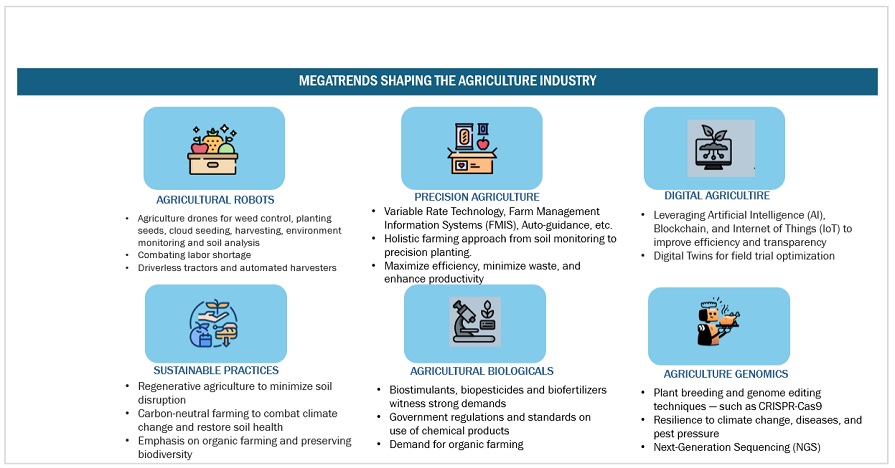Global Agriculture Industry Outlook Statistics, Opportunities & Forecast
- Get link
- X
- Other Apps
The future of agriculture stands at a critical juncture, with the need to produce more food while mitigating the challenges posed by climate change and resource scarcity. To address these pressing issues, the industry is on the brink of a technological revolution, emphasizing precision agriculture, innovative farming practices, and sustainable solutions. This article delves into the market dynamics, opportunities, challenges, and recent developments shaping the global agriculture industry in 2024.
According to a research report “Global Agriculture Industry Outlook 2024 – Feeding the Future Through Innovation” published by MarketsandMarkets, the Top 10 Agriculture Markets Will Grow From USD 81.5 billion In 2023 to USD 94.3 billion by 2024 at A YOY Increase of 15.7%.
The global agriculture industry stands at a pivotal moment, with the need to balance growing food demand with environmental sustainability. Embracing technological innovation, fostering regional collaboration, and implementing sustainable practices are essential for navigating the challenges ahead. By working together towards a common goal of food security and environmental stewardship, the agriculture industry can pave the way for a prosperous and sustainable future.
Market Dynamics:
Driver: Meeting Rising Food Demand
The exponential growth of the global population, projected to reach 10 billion by 2050, necessitates a 50% increase in agricultural output. Traditional farming methods face limitations exacerbated by resource scarcity, emphasizing the urgency for agricultural transformation. Precision agriculture emerges as a key strategy to intensify production while ensuring sustainability, optimizing resource utilization through data-driven approaches.
Restraint: Investment Gap in Developing Nations
The lack of investment in infrastructure and research poses a significant hurdle for agricultural development in developing countries. Outdated systems and limited access to technology hinder the adoption of innovative practices, leaving farmers vulnerable to climate change and resource constraints. Bridging this investment gap is crucial for fostering resilience and sustainability in agriculture.
Opportunities: Technological Innovation
Technological advancements, including precision agriculture, automation, and gene editing, offer promising solutions to enhance productivity and sustainability. These innovations enable targeted resource management, early detection of crop issues, and the development of climate-resilient crops. Embracing these technologies is essential for meeting growing food demands while minimizing environmental impact.
Challenge: Environmental Roadblocks
Climate change poses significant challenges to agricultural productivity, leading to erratic weather patterns, water scarcity, and soil degradation. Rising sea levels and competition for freshwater further exacerbate these environmental pressures. Addressing these challenges requires concerted efforts to implement sustainable practices and mitigate the impact of climate change on agriculture.
Rebuilding the Ground Up: Exploring Regenerative Agriculture
Regenerative agriculture emerges as a holistic approach to restore soil health, enhance biodiversity, and mitigate climate change. By prioritizing soil conservation and carbon sequestration, regenerative practices offer a pathway to sustainable agriculture. However, widespread adoption requires supportive policies and incentives to overcome initial barriers and ensure long-term viability.
Asia Pacific: Opportunities for Growth
The Asia Pacific region presents significant opportunities for agricultural growth, driven by technological innovation and regional collaboration. Smallholder farmers play a crucial role in the region’s agriculture, highlighting the importance of empowering them through access to technology and markets. Adapting to climate change and promoting sustainable practices are key to ensuring future food security in the region.
Leading Companies in the Agriculture Industry
In the agrigenomics industry Eurfins Scientific (Luxembourg), and Illumina Inc. (US) are leading the charge. In the connected space IBM (US), AT&T (US), and Microsoft (US) are leveraging their expertise in technology to offer premium agricultural services. For organic agricultural production, Syngenta (Switzerland), UPL (India), BASF SE (Germany), Bayer AG (Germany), and Marrone Bio Innovation, Inc. (US) are at the forefront. Additionally, in plant breeding and CRISPR Plants technologies companies such as Corteva, Inc. (US), BASF SE (Germany), and Bayer AG (Germany), are leading the charge by offering biotechnological and conventional methods of plant breeding to obtain desirable agriculture outputs.
- Get link
- X
- Other Apps

Comments
Post a Comment